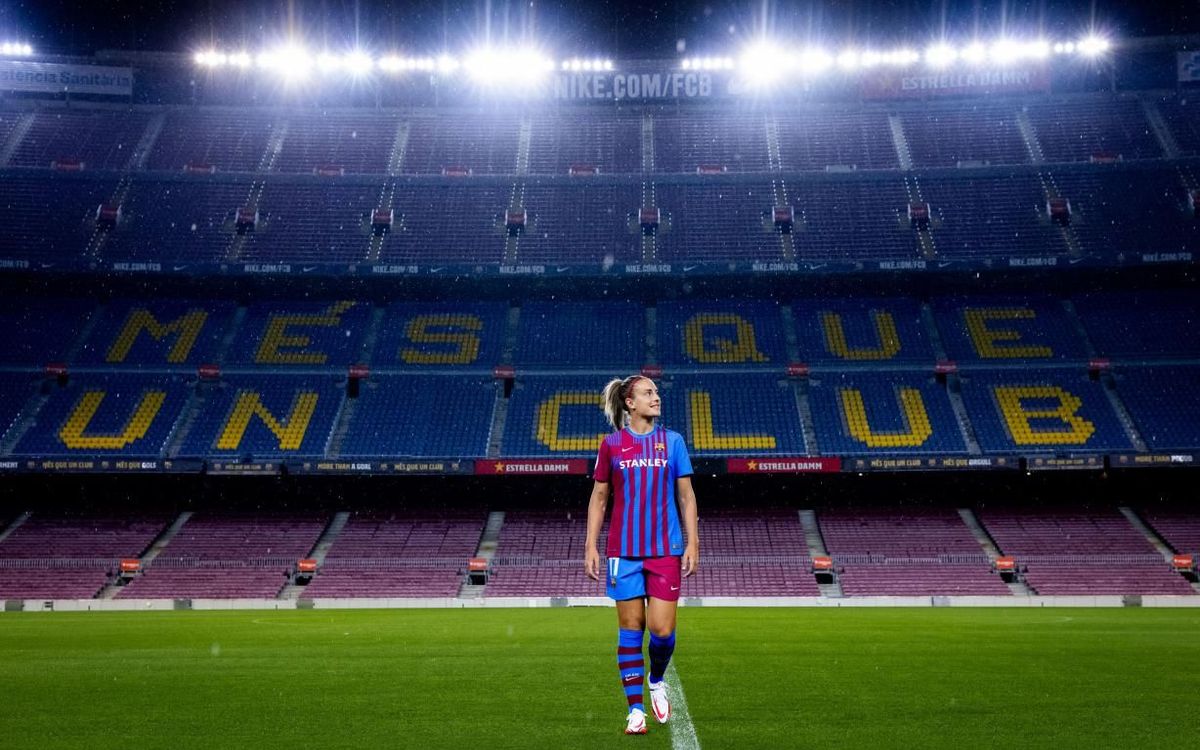Alexia, the queen of Europe
- Viber
- Messenger
- Copy link
In December 2015, Alexia Putellas was named Catalan Player of the Year and appeared in a special report in Revista Barça together with her male counterpart Gerard Piqué. It was the first time a female player had ever appeared on the cover of the Barça magazine. Six years later and Alexia is part of the treble winning team and was named UEFA Women’s Player of the Year. So much has changed in those six years. She is now a global icon and superstar, and it’s time to catch up with her again.
In the previous article, you told Piqué that you’d be in the Champions League final in two years’ time, and he replied “that would be awesome.” You reached two finals, and won one of them. How can you explain such rapid advances?
It has all happened so quickly for me because I’ve been enjoying it so much. Time is racing by. I’m relaxed and not struggling to cope, quite the contrary, I’m loving it. Things have happened faster than expected. As soon as they started investing in our professionalism, the results started to come. Nobody expected it so quick, but it’s nice to see that we have capitalised on those investments.
In ten seasons you’ve witnessed big developments in the women’s team. Have you and Melanie Serrano (18 years in the senior team) who know how this started, been able to get across to the younger players how hard it was to get here?
Everyone in the team appreciates that. We don’t generally need to remind people about those things, like reminding them now and again that we used to train at 9.00pm and 15 years ago, Mel didn’t even train at the Ciutat Esportiva, but on an athletics field on an awful pitch. It’s nice to point these things out now and again but also celebrate how we have got where we deserve to be in this sport. What we have now is normal, not before. But we mustn’t forget how hard it was to achieve it.

In five years you have gone from being the best in Catalonia to the best in Europe?
I appreciate it as much as I should. The athlete’s mentality is to take each day as it comes. You don’t really notice how big individual awards are until you retire. You’re on a roll and you can stop, but because if you do, you don’t perform. You feel exhausted when summer arrives and you really need a holiday to get some rest, reinvent yourself and then go out and win everything again. When you’re wearing this shirt you can’t afford to look back because if you do, you lose your hunger and ambition.
Last season you were spectacular: 43 games, 26 goals and 2 in the Champions League (the most goals by any midfielder in Europe); MVP of the Copa de la Reina. Are you aware of how much you’ve developed?
It’s not easy to achieve such stats, but when you’re surrounded by such good players... It is normal for a Barça forward to score 15 goals a season and I don’t want to put pressure on them [laughs]. Behind the forwards we work hard to create chances to score. Yes, I’m 100% aware of my development. As an U17 they were telling me I had talent, but what you need to work on are physical, psychological, tactical aspects and I still want to work on those areas because it’s not just about natural talent. It’s very important to be mentally strong and not to only go by results.
At the Olympic Games we saw how the psychological part is getting more important. How do you work on that?
The club has always offered psychological supports, we have a whole team that helps us with those things. But when I feel I’m under too much pressure I tell myself that pressure is a privilege. What does a footballer, male or female, want? To play with friends on a Sunday or play under pressure in a Champions League fina? I focus on the fact that it’s a privilege. Having grown up at Barça has helped me because just by pulling on that shirt you are already under pressure. The way I felt ten years ago has nothing to do with what I feel now. I deal with it all very naturally.
You’ve never felt anxiety because so much is expected of you?
No, because winning the European Player of the Year award isn’t going to change the way I live football and knowing what I want, who I am, where I want to get… it doesn’t change my goals. It’s like that with results. Win or lose, my targets are always the same.
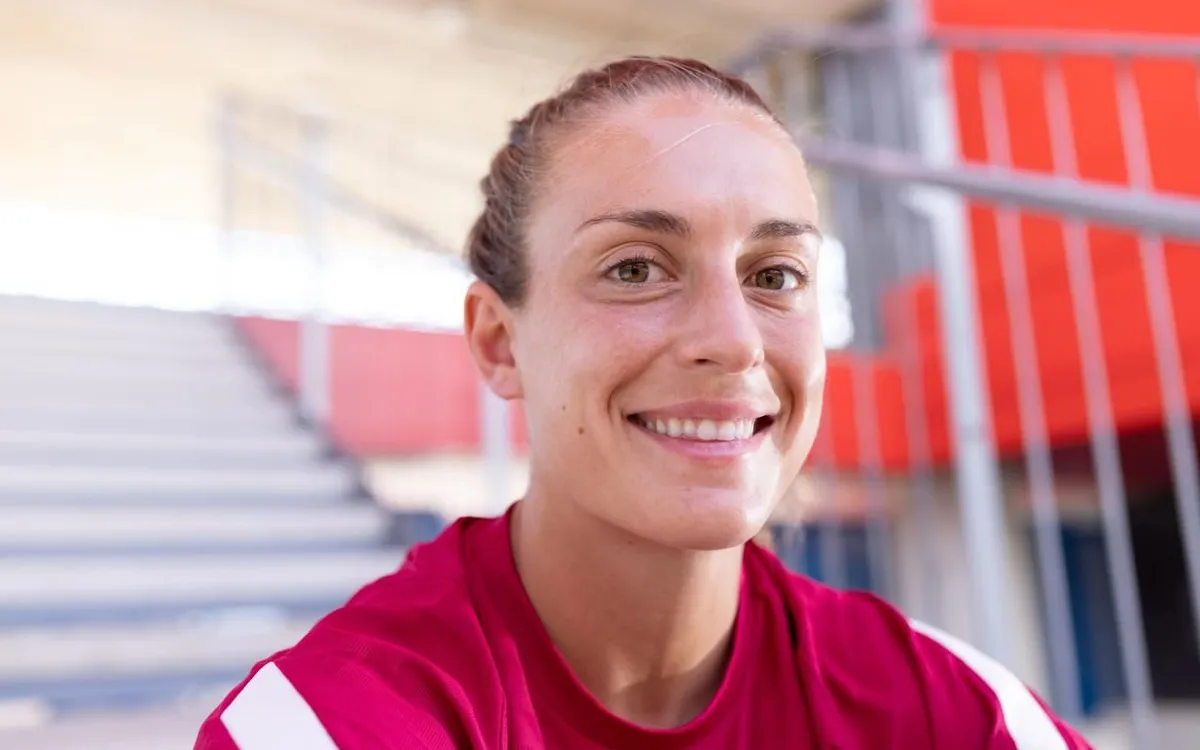
Do you worry about other things, like diet?
Yes, I put on ten points of muscle mass in a single year and lost six in fat. That helps you to perform.
You became a media name after your goal in the 2013 Copa de la Reina, which they called “Messi style”. They said the same in October 2020 after you scored against Sporting Huelva. How do you feel to be compared to Messi?
The “Messi” label is an adjective, incredible, great… But these things come naturally to me, I don’t plan them.
It’s not just the Barça team winning that people love, it’s the way you win...
The Barça style has been on show around the world for years and the fans find that style attractive and are proud of the Barça philosophy.
In 2015 you said nobody ever recognised you in the street. How are you dealing with your sudden fame?
I’m very introverted, I live in my bunker. But there is also my professional side and I owe that to the fans and members. We saw that with the pandemic, we are nothing without the fans. It totally changes the sport. That part needs to be nourished and if you have to stay behind for fifteen minutes and sign shirts for fans who have paid to watch you, then it is not hard to do.
In the Barça Studios documentary ‘Born to Play’ you show your more personal side and your special relationship with your sister Alba, and talk about your father’s death...
I didn’t want to do it at first but my family and the club convinced me. I often wonder what my father would think about me today and I’m sure he’d be really happy. It’s a taboo subject within the family. We find it hard to talk about my father.
After winning the Champions League, what other dreams do you have?
To carry on the same. My dream now is to think that when I leave this club I'll be leaving a legacy, having given everything and won trophies.
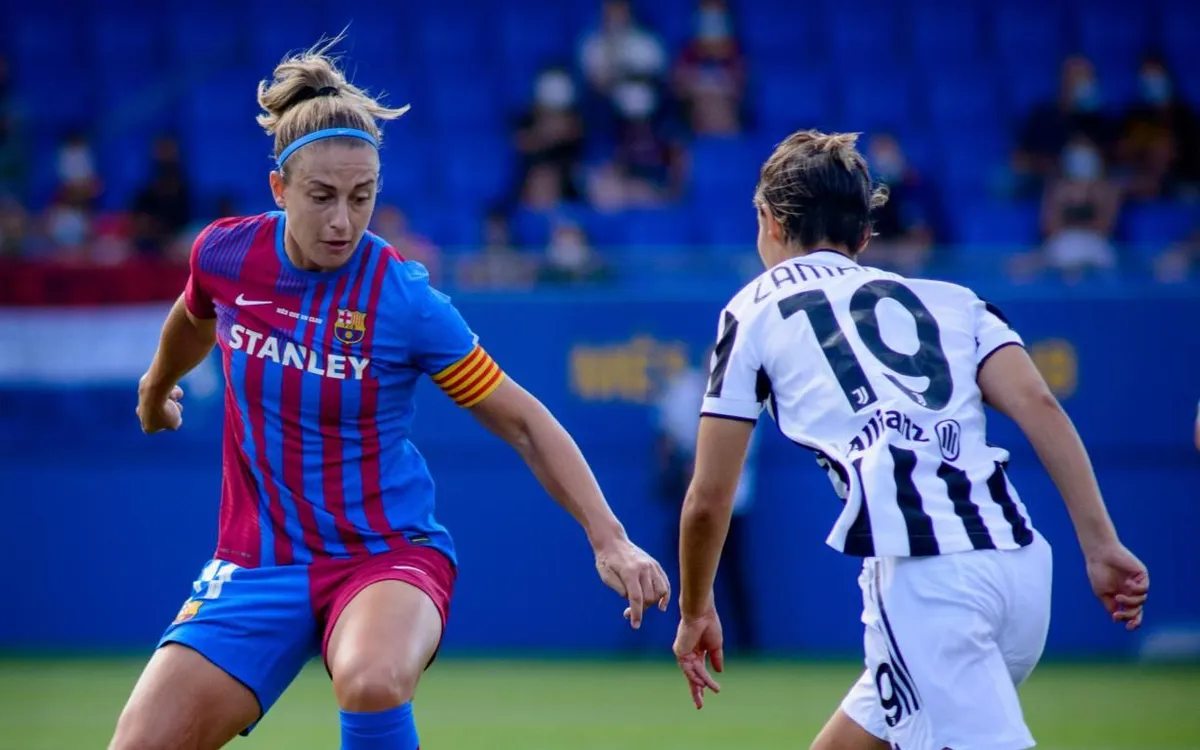
From now on, as captain, you will lift up the trophy, is that exciting?
In the Gamper game my team mates said to me that I had to train lifting trophies because up to now I had not done it...It is a special moment but you are not on your own, the important thing is the path you have chosen to get there and how you did it.
What have you learned from previous captains such as Vicky Losada, Marta Unzué, Laura Ràfols...?
From my first captain, Ani Escribano, I have learned from all of them. Things that have made me grow, things that perhaps were not the most convenient...From everything they did, I have managed to take something away and that is learning. It is thanks to them that I am the player that I am.
As captain, what role do you have with regards to your team mates?
The captain is the first to make a commitment to the objectives that are set internally, they have to lead by example to reinforce that.
You have been voted the best in Europe and you are a mirror for all the young girls who play football. Do you feel some kind of social resposibility?
I feel the social responsibility that comes with being a women, my mother has it, you have it...The fact of being a women means you have a social responsibility because in history, amongst all of them, they have brought about change such as women's suffrage etc. Now we are fighting for equal opportunities, valuing a person regardless of their sex and that is important for all women, that we are all conscious of that whatever our profession may be. Ours, even more so because I have not had female role models. Girls today see that they have named several Barça players as the best in Europe and the most important thing is that these girls have the opportunity to do the same. There is still a way to go.
The Club has a new of Equality, Inlcusion and Diversity. Is equality key?
When I feel most comfortable is when they treat me as a footballer, not a male or female player, a footballer and I think this is where we need to go.
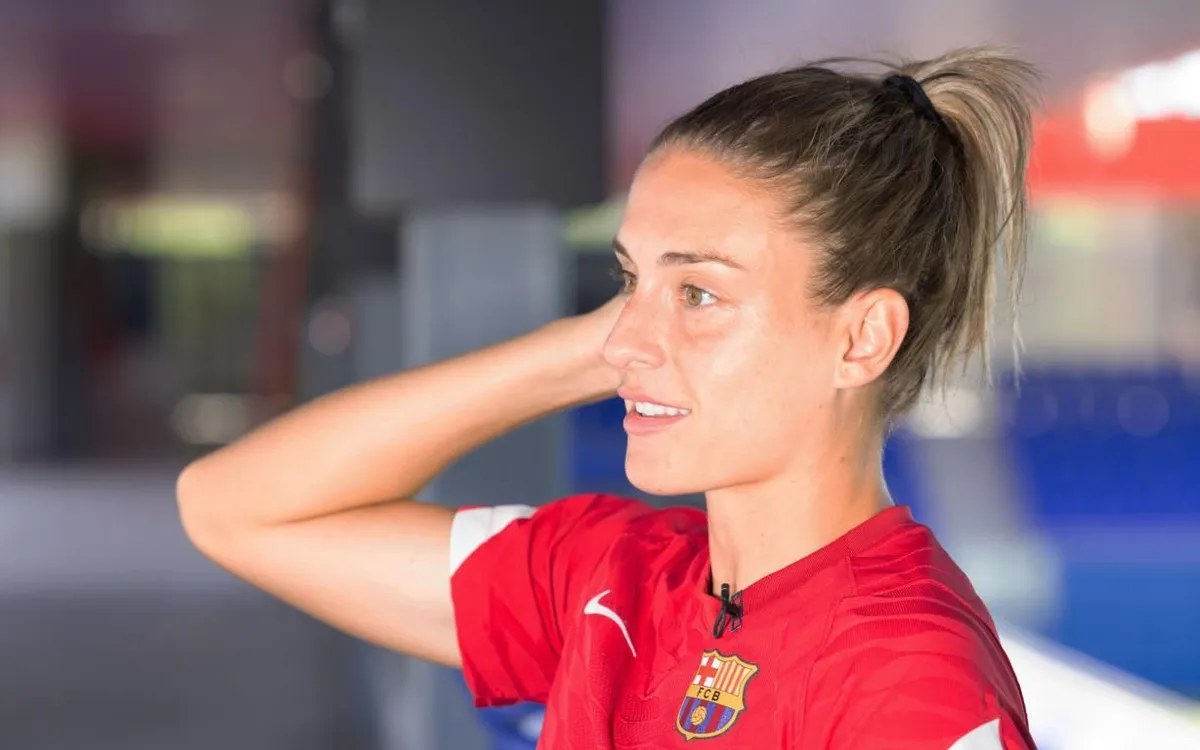
La Masia is now mixed...history has been made!
The fact that there are girls who are there 24 hours a day to develop as players and as people, and as students, is fantastic. I just wish I had had the opportunity when I was young! If we have got where we are today without La Masia, imagine what these girls will be capable of. My coaches were, with all due respect, the parents and uncles of my team mates. Now there girls will have qualified coaches who really know about football, imagine how much the level will improve!
The future is looking great. However, it is important to not just just invest in young female footballers but also the people around the team. For that reason it's important to have equal opportunities with regards to buying shirts, that the matches receive publicity on TV because if not, the message is that "they don't generate income" will always be there. It's vital that if someone wants to buy a shirt with the name of one of my team mates, that they can find it. That the fans know, at least a week before, when the game is. These are small details that change that message of "they don't generate income" because it will raise the value of competitions, better salaries etc. It's like a circle, if you break it somewhere then you lose it all.
There is a children's book called 'Alexia Superfootballer' and the main character draws inspirations from you...
There weren't players who had made a children's book and when you come to the Estadi Johan Cruyff you see a lot of families with children. I wanted to get across via the fictional story that it was not important that the character was a girl playing football. It is aimed at kids to make it feel more natural - it's important that they grow up like that.
They say that the dressing room in women's football is difficult to manage.
There are bigger problems than thinking about whether the dressing room is more difficult to manage or not. I was talking about this with a team mates and we just wish they would treat us like footballers. We are professionals and we want to be considered as such. After so many year as a professional we know all too well this cliché.
There is a good atmosphere in the squad, many of you went on holiday together.
We have holidays in June and July and our friends and family in August, that means you often go away with friends from the team or from football. This year, after winning the Champions League, 12 of us went to Ibiza together.
You warn that after the treble last season, this one will not be so easy .
As a team we have shown what we can do and now team are studying us and you probably can't do the same things. For that reason, every year you need to change up, individually and collectively. Moreover, our style is very flexible - the space - however much our opponents try, will always be there. We have to bend matches to our will and that what we train for.
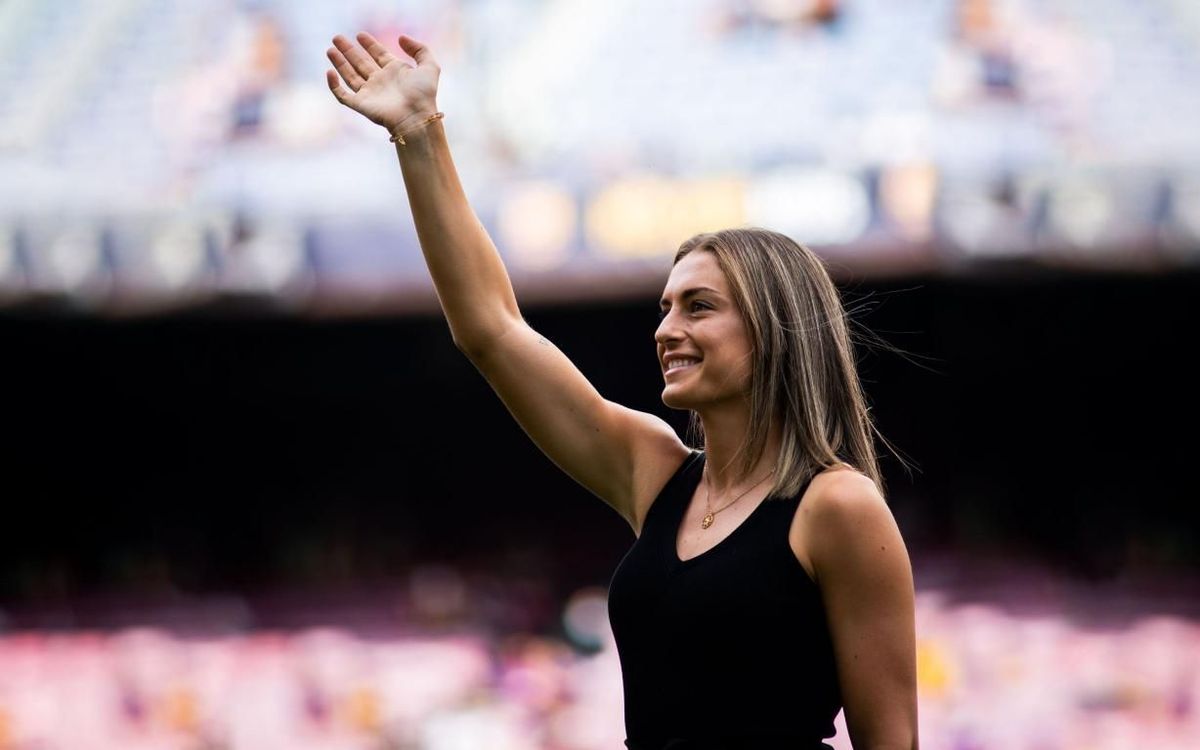
The final in Budapest put you on the path. What is your motivation now?
The motivation is to do it all again. In our heads, we are no longer champions. Also, the fact that there were no fans and we could not share it with them is also a motivating factor. We have seen that without fans, we are nothing, it changes the game completely.
Your speech at the Gamper game was impressive.
I wanted to make a point about being proud of Barça. It was not difficult, I believed what I was saying.
Are you excited about having extended your contact?
It's the contract renewal that I have been most excited about because I am really looking forward to trying to repeat what we did last year. I am excited by challenges and this is a motivating one! I am training every day to keep improving and for the time to go quickly. My aim is to retire here but I want to be able to give 100%.
Have you though about where your professional future lies?
I will have to be really burnt out not to want to remain in football. Every day I get more interested in coaching but I don't know if I would do it at all levels.
In the future do you see a women coaching the team?
Yes - and the men's team too.
- Viber
- Messenger
- Copy link
